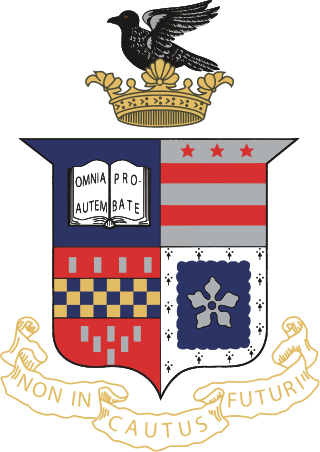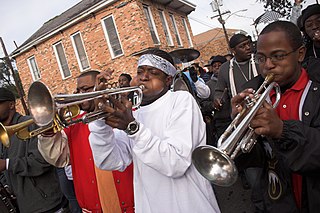Jazz is a music genre that originated in the African-American communities of New Orleans, Louisiana, in the late 19th and early 20th centuries, with its roots in blues, ragtime, European harmony and African rhythmic rituals. Since the 1920s Jazz Age, it has been recognized as a major form of musical expression in traditional and popular music. Jazz is characterized by swing and blue notes, complex chords, call and response vocals, polyrhythms and improvisation.

The Original Dixieland Jass Band (ODJB) was a Dixieland jazz band that made the first jazz recordings in early 1917. Their "Livery Stable Blues" became the first jazz record ever issued. The group composed and recorded many jazz standards, the most famous being "Tiger Rag". In late 1917, the spelling of the band's name was changed to Original Dixieland Jazz Band.

Dominic James "Nick" LaRocca, was an American early jazz cornetist and trumpeter and the leader of the Original Dixieland Jass Band, who is credited by some as being "the father of modern jazz". He is the composer of one of the most recorded jazz classics of all-time, "Tiger Rag". He was part of what is generally regarded as the first recorded jazz band, a band which recorded and released the first jazz recording, "Livery Stable Blues" in 1917.
Swing music is a style of jazz that developed in the United States during the late 1920s and early 1930s. It became nationally popular from the mid-1930s. The name derived from its emphasis on the off-beat, or nominally weaker beat. Swing bands usually featured soloists who would improvise on the melody over the arrangement. The danceable swing style of big bands and bandleaders such as Benny Goodman was the dominant form of American popular music from 1935 to 1946, known as the swing era, when people were dancing the Lindy Hop. The verb "to swing" is also used as a term of praise for playing that has a strong groove or drive. Musicians of the swing era include Duke Ellington, Benny Goodman, Count Basie, Cab Calloway, Benny Carter, Jimmy Dorsey, Tommy Dorsey, Woody Herman, Earl Hines, Bunny Berigan, Harry James, Lionel Hampton, Glenn Miller, Artie Shaw, Jimmie Lunceford, and Django Reinhardt.
Jazz standards are musical compositions that are an important part of the musical repertoire of jazz musicians, in that they are widely known, performed, and recorded by jazz musicians, and widely known by listeners. There is no definitive list of jazz standards, and the list of songs deemed to be standards changes over time. Songs included in major fake book publications and jazz reference works offer a rough guide to which songs are considered standards.

Washington and Lee University is a private liberal arts college in Lexington, Virginia. Established in 1749 as Augusta Academy, it is among the oldest institutions of higher learning in the United States.
Western swing is a subgenre of American country music that originated in the late 1920s in the West and South among the region's Western string bands. It is dance music, often with an up-tempo beat, which attracted huge crowds to dance halls and clubs in Texas, Oklahoma and California during the 1930s and 1940s until a federal war-time nightclub tax in 1944 contributed to the genre's decline.

The Blind Boys of Alabama, also billed as The Five Blind Boys of Alabama, and Clarence Fountain and the Blind Boys of Alabama, is an American gospel group. The group was founded in 1939 in Talladega, Alabama, and has featured a changing roster of musicians over its history, the majority of whom are or were vision impaired.

"Dixie", also known as "Dixie's Land", "I Wish I Was in Dixie", and other titles, is a song about the Southern United States first made in 1859. It is one of the most distinctively Southern musical products of the 19th century. It was not a folk song at its creation, but it has since entered the American folk vernacular. The song likely rooted the word "Dixie" in the American vocabulary as a nickname for the Southern U.S.

"Tiger Rag" is a jazz standard that was recorded and copyrighted by the Original Dixieland Jass Band in 1917. It is one of the most recorded jazz compositions. In 2003, the 1918 recording of "Tiger Rag" was entered into the U.S. Library of Congress National Recording Registry.

"(Back Home Again in) Indiana" is a song composed by James F. Hanley with lyrics by Ballard MacDonald that was published in January 1917. Although it is not the state song of Indiana, it is perhaps the best-known song that pays tribute to the Hoosier state.

The Sun Devil Marching Band (SDMB), also known as The Pride of the Southwest, is the athletic band of Arizona State University in Tempe, Arizona. The Sun Devil Marching Band motto is “Expect Great Things.” The acronym EGT is inscribed on a sign that hangs from the director's podium towering over the band's practice field, and is a symbol of the high standards that band members strive to meet. The ASU Band program, which includes the Marching, Pep, and Dixieland bands, is a part of the Sun Devil Athletics department. The band is currently under the direction of Director of Athletic Bands James G. "The Hammer" Hudson, who took over the program in 2006. The Sun Devil Marching Band is a major ambassador for Arizona State University and the state of Arizona. Each year almost 500,000 people are entertained by the band, which plays at home football at Sun Devil Stadium and as a pep band for basketball games at Wells Fargo Arena, homecoming, bowl game parades, other community events in the Valley, across the country, and even abroad.

The music of New Orleans assumes various styles of music which have often borrowed from earlier traditions. New Orleans, Louisiana, is especially known for its strong association with jazz music, universally considered to be the birthplace of the genre. The earliest form was dixieland, which has sometimes been called traditional jazz, 'New Orleans', and 'New Orleans jazz'. However, the tradition of jazz in New Orleans has taken on various forms that have either branched out from original dixieland or taken entirely different paths altogether. New Orleans has also been a prominent center of funk, home to some of the earliest funk bands such as The Meters.

"Margie", also known as "My Little Margie", is a 1920 popular song composed in collaboration by vaudeville performer and pianist Con Conrad and ragtime pianist J. Russel Robinson, a member of the Original Dixieland Jazz Band. Lyrics were written by Benny Davis, a vaudeville performer and songwriter. The song was introduced by the Original Dixieland Jazz Band in 1920 as Victor 78, 18717-A, in a medley paired with "Singin' the Blues". The B side was "Palesteena". The ODJB recorded their instrumental version on December 1, 1920.

The SMU Mustang Band, known as "the Hub of SMU Spirit" or the "Best Dressed Band in the Land" because of its 32 unique uniforms, is the marching band of Southern Methodist University. The band represents the University at football games, produces the Pigskin Revue during Homecoming, and performs at special university and community-related events. Founded in 1917, the Mustang Band is currently under the direction of Director Charles Aguillon, Assistant Director Paul Crockett, and Drumline Instructor Jon Lee.

"Livery Stable Blues" is a jazz composition copyrighted by Ray Lopez and Alcide Nunez in 1917. It was recorded by the Original Dixieland Jass Band on February 26, 1917, and, with the A side "Dixieland Jass Band One-Step" or "Dixie Jass Band One-Step", became widely acknowledged as the first jazz recording commercially released. It was recorded by the Victor Talking Machine Company in New York City at its studio at 46 West 38th Street on the 12th floor – the top floor.

The following outline is provided as an overview of and topical guide to jazz:
Robert Vernor Hammack, Jr. was an American musician, originally from Texas, whose principal instrument was jazz piano. He led a prolific career in Los Angeles as a pianist, organist, conductor, arranger, and composer in (i) live venues, (ii) broadcast studios for radio and television, and (iii) recording studios for records, radio, television, and film. Hammack flourished in a wide spectrum of genres that included dixieland, Blues, swing, sweet dance music (e.g., Lawrence Welk), easy listening, gospel, liturgical jazz, musical theatre, Tin Pan Alley, classical, and film score.













